Last updated on December 12th, 2024 at 03:43 pm
Do Bobcats Attack Humans? Yes, bobcats can attack humans, but such incidents are rare.
Bobcats, with their distinctive tufted ears and short, “bobbed” tails, are a familiar sight in North American wilderness.
These elusive and nocturnal creatures are often a topic of curiosity and concern, particularly when it comes to human safety.
The question many people ask is: do bobcats attack humans? This blog post will delve into this question, exploring bobcat behavior, incidents involving humans, and what to do if you encounter one.
Contents
Who Is the Bobcat?
The bobcat (Lynx rufus) is a medium-sized wildcat native to North America. They are adaptable animals found in various habitats, including forests, deserts, and urban areas.
Bobcats are solitary and territorial, primarily preying on small mammals like rabbits and rodents. They are about twice the size of a domestic cat, with males typically larger than females.
Physical Characteristics
Bobcats are easily recognizable by their physical traits. They have a robust build with long legs, large paws, and a distinctive tuft of black fur on their ears.
Their fur is usually brown or beige with black spots and streaks, providing excellent camouflage in their natural habitats.
The bobcat’s short, stubby tail, which appears to be “bobbed,” gives the animal its name. [Do Bobcats Attack Humans?]
Habitat and Range
Bobcats are incredibly adaptable and can thrive in a variety of environments.
They are found throughout North America, from southern Canada to northern Mexico. Their habitats include forests, swamps, deserts, and even urban areas.
This adaptability has allowed them to survive in close proximity to human populations, leading to occasional encounters.

Bobcat Behavior and Interaction with Humans
Bobcats are generally elusive and avoid human interaction. Their natural behavior is to steer clear of populated areas and human activity.
However, as urban areas expand into their habitats, sightings and potential encounters have become more common.
Natural Diet and Hunting Habits
Bobcats are carnivorous, primarily hunting at dawn and dusk. Their diet mainly consists of small mammals, birds, and occasionally deer.
They are known for their stealth and patience, often stalking their prey before pouncing. [Do Bobcats Attack Humans?]
Bobcats are solitary hunters, relying on their keen senses of sight and hearing to locate prey. They can cover large territories, marking their range with scent markings and visual signals.
Bobcats in Urban Areas
As human development encroaches on natural habitats, bobcats can occasionally be spotted in suburban and urban areas.
They may be drawn to these areas in search of food, water, or shelter. However, they typically remain wary of humans and are unlikely to approach unless provoked or desperate.
Urban environments provide bobcats with ample food sources, such as rodents, birds, and even household pets.
They are also attracted to garbage and pet food left outside. While they may appear bold in these settings, they are usually skittish and will avoid human contact whenever possible.
Do Bobcats Attack Humans?
Bobcat attacks on humans are extremely rare. These animals are naturally shy and prefer to avoid confrontation.
Most documented cases of bobcat aggression towards humans involve rabid individuals. Here are a few notable incidents:
Rabid Bobcat Attacks
When infected with rabies, bobcats can exhibit unusually aggressive behavior. Rabid bobcats may attack without provocation, posing a serious risk to humans and pets.
Such cases are rare but require immediate medical attention if a person is bitten or scratched. [Do Bobcats Attack Humans?]
Rabies is a viral disease that affects the central nervous system and is almost always fatal once symptoms appear.
Several documented cases highlight the danger posed by rabid bobcats. In one incident, a rabid bobcat attacked a woman in her yard, causing severe injuries.
The woman required medical treatment, including rabies vaccinations. Such attacks underscore the importance of vaccinating pets and avoiding contact with wild animals that appear sick or behave abnormally.
Provoked Attacks
Like most wild animals, bobcats may become defensive if they feel threatened or cornered. [Do Bobcats Attack Humans?]
If a bobcat is protecting its young or is injured, it may react aggressively if approached. Provoked attacks often occur when people inadvertently corner a bobcat or attempt to handle it.
Bobcats are strong and agile, capable of inflicting serious injuries with their sharp claws and teeth.
One notable incident involved a hiker who stumbled upon a bobcat den. The bobcat, likely protecting its young, attacked the hiker, resulting in minor injuries.
Such encounters emphasize the need for caution when exploring wild areas and respecting wildlife habitats.
Misidentification and Misconceptions
It’s important to note that not all reported bobcat attacks are genuine. In some cases, other animals, such as domestic cats or feral dogs, are misidentified as bobcats.
Additionally, myths and misconceptions about bobcat behavior can lead to unnecessary fear and exaggerated reports of attacks.

Understanding Bobcat Behavior
To fully understand the potential for bobcat attacks on humans, it’s essential to delve deeper into their behavior and natural instincts. This understanding can help dispel myths and provide a clearer picture of the risks involved.
Territorial Nature
Bobcats are highly territorial animals. Males have larger territories than females, and they mark their boundaries with scent markings and visual signals.
These territories can range from one to several square miles, depending on the availability of food and shelter. Territorial disputes between bobcats are common and can lead to aggressive encounters.
Nocturnal and Solitary Lifestyle
Bobcats are primarily nocturnal, meaning they are most active during the night. Their solitary nature means they spend most of their lives alone, except during mating season or when raising young.
This solitary lifestyle reduces the likelihood of human encounters, as they are less likely to be active during the day when people are more active.
Defensive Behavior
When threatened, bobcats will typically try to flee rather than confront a perceived danger. They are agile climbers and can quickly escape to higher ground if necessary.
However, if cornered or unable to escape, they will defend themselves aggressively. Understanding this defensive behavior is crucial for minimizing the risk of attacks.

What to Do If You Encounter a Bobcat
While encounters with bobcats are uncommon, it is important to know how to react to ensure your safety and the animal’s well-being.
Stay Calm and Back Away Slowly
If you encounter a bobcat, remain calm. Do not run, as this may trigger a predatory response. Slowly back away while facing the bobcat. Avoid making sudden movements that could provoke the animal.
Make Yourself Appear Larger
Raise your arms, open your jacket, or stand on a rock or log to appear larger. This can help to intimidate the bobcat and deter it from approaching.
Most wild animals, including bobcats, are more likely to retreat when confronted by a larger, more imposing figure.
Use Loud Noises to Scare It Away
Clap your hands, shout, or use a whistle to make loud noises. Bobcats are generally skittish and will likely retreat when confronted with loud, unexpected sounds.
Carrying a whistle or air horn when hiking in bobcat territory can be an effective deterrent.
Do Not Approach or Corner the Bobcat
Avoid approaching the bobcat, especially if it appears to be injured or with cubs.
Cornering the animal may provoke an attack. [Do Bobcats Attack Humans?]
Give the bobcat plenty of space to escape and do not attempt to handle it under any circumstances.
Seek Medical Attention If Bitten or Scratched
If you are bitten or scratched by a bobcat, seek immediate medical attention, especially if the animal appeared sick or was acting unusually aggressive.
Rabies is a serious concern, and prompt treatment is essential to prevent infection.

Living in Bobcat Territory
For those living in areas where bobcats are present, taking steps to minimize the risk of encounters is essential.
By making a few simple adjustments, you can reduce the likelihood of attracting bobcats to your property and ensure a safer environment for both you and the wildlife.
Secure Garbage and Food Sources
Bobcats, like many wild animals, are attracted to food sources. Secure garbage cans with tight-fitting lids and avoid leaving pet food or birdseed outside.
Removing potential food sources will make your property less appealing to bobcats.
Protect Pets and Livestock
Small pets and livestock can be vulnerable to bobcat attacks. Keep pets indoors at night and provide secure enclosures for outdoor animals.
Installing motion-activated lights or sprinklers can also help deter bobcats from approaching your property.
Remove Shelter Areas
Bobcats may seek shelter in brush piles, abandoned buildings, or other structures.
Removing these potential shelters can reduce the likelihood of a bobcat taking up residence near your home.
Keep your yard tidy and free of debris that could provide cover for wildlife. [Do Bobcats Attack Humans?]
Educate Yourself and Others
Educating yourself and your neighbors about bobcat behavior and safety measures can help create a safer community.
Understanding how to coexist with bobcats and other wildlife is essential for preventing conflicts and ensuring the well-being of both humans and animals.
See Also: Do Coyotes Attack Humans? Unseen Predators!
FAQs
Q: Are bobcats dangerous to pets?
A: Bobcats can pose a threat to small pets, especially if they are left unattended outdoors. It is advisable to supervise pets and keep them indoors at night. Larger pets, such as dogs, are less likely to be targeted by bobcats, but it’s still important to be cautious.
Q: Can a bobcat kill a human?
A: It is highly unlikely for a bobcat to kill a human. Bobcats are generally not aggressive towards people and attacks are rare. Most incidents involve rabid animals or provoked attacks, neither of which typically result in fatalities.
Q: How can I keep bobcats away from my property?
A: To deter bobcats, secure garbage, avoid leaving pet food outside, and remove potential shelter areas like brush piles or abandoned structures. Additionally, installing motion-activated lights or sprinklers can help keep bobcats at bay.
Q: What should I do if I see a bobcat near my home?
A: If you see a bobcat near your home, observe it from a safe distance and do not approach it. Make loud noises to encourage it to leave, and ensure that pets and children are brought indoors. If the bobcat appears sick or aggressive, contact local wildlife authorities.
Q: Are bobcats protected by law?
A: Bobcats are protected by various state and federal laws, and hunting or trapping them may require special permits. It’s important to familiarize yourself with local regulations and seek professional assistance if you need to remove a bobcat from your property.
Q: Can bobcats climb trees?
A: Yes, bobcats are excellent climbers and often use trees to escape predators or survey their surroundings. Their sharp claws and strong limbs make them adept at climbing and maneuvering through dense foliage.
Q: Do lynx attack humans?
Lynx are generally shy and avoid humans, making attacks extremely rare. They may become defensive if cornered or protecting their young, but they do not view humans as prey.
Conclusion: Do Bobcats Attack Humans?
While the idea of encountering a bobcat may be alarming, it’s important to remember that these animals are generally not a threat to humans.
Bobcats are more interested in avoiding us than causing harm. By understanding their behavior and knowing how to react if you encounter one, you can coexist peacefully with these fascinating creatures.
Living in harmony with wildlife requires respect and knowledge.
By taking steps to secure your property, protect your pets, and educate your community, you can minimize the risk of bobcat encounters and enjoy the beauty of these remarkable animals from a safe distance.

Hello, I am Rosa Ellis, a mother of two and a wildlife blogger. I grew up in New York City, but I love exploring forests. I’ve traveled to places like Yellowstone National Park and the Amazon Rainforest to see animals up close. I know a lot about animal behavior and which animals can be dangerous to humans. Thanks for visiting my blog!

